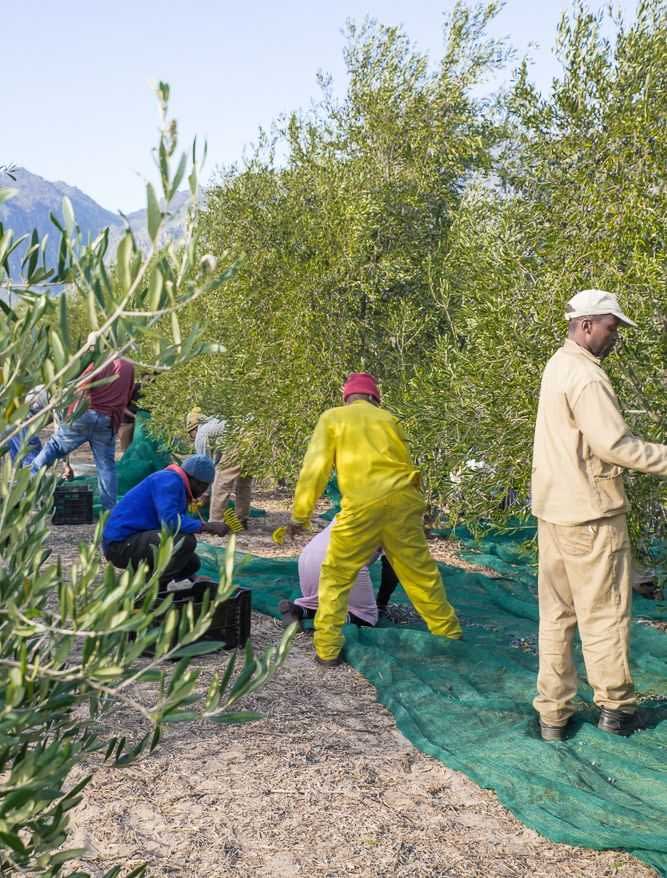South African producers kicked off the 2021 olive harvest in late February and expect to finish off the harvest in August.
With about half of the harvest already finished, some producers anticipate a smaller yield than last year.
There’s never a dull moment (during the olive harvesting season), but that makes for a stronger drive to attain success.
“Most producers are harvesting as we speak,” Vittoria Jooste, manager of the South African Olive Industry Association (SA Olive), told Olive Oil Times. “We have not had weather challenges this year; however, some producers expect their 2021 harvest to be below last year’s. This is due to the cyclical nature of olive growing, and 2020 was a bumper harvest.”
According to Jooste, South Africa produced slightly more than 1.5 million liters of extra virgin olive oil in 2020. She estimated that this year the yield may be about 1.36 million liters.
See Also:2021 Harvest Updates“The rule of thumb is that it takes five kilograms of olives to make one liter of oil, hence we can estimate that 7,500 tons of olives were harvested for extra virgin olive oil production,” she said. “Additionally, some 1,500 tons of olives were processed for table olives.”
“Expectations are that the 2021 harvest should be between the 2019 and 2020 levels,” Jooste added. “We are still waiting for the harvest to come to an end, but the expectation is that it will be slightly down on 2020.”
Despite the absence of climatic challenges, producers have reported difficulties with pests, ongoing Covid-19 workplace restrictions and load shedding – a euphemism for power cuts.
Hedley Manicom, the co-owner of Owl’s Rest Olive and Lavender Farm in the Klaasvoogds Valley of the Western Cape, told Olive Oil Times they harvested “very little this year, while last year was a record.” He said this year’s harvest was “much worse” than last year’s.
The team at Owl’s Rest started harvesting in April and wrapped up a few days ago.
“We did a very hard prune after last season, so we were not expecting much,” Manicom said, “Then we had some pest issues believed to be citrus bloom moth larvae, which we didn’t pick up until it was too late.”
Citrus bloom moths typically attack citrus fruit causing necrotic lesions but are also known to attack other plants, including olive trees.
Even though 2020 marked the end of the South African drought in the west of the country, Phillip King, general manager of Mardouw Olive Estate in the foothills of the Langeberg Mountains, told Olive Oil Times they received “below average rainfall the past year.”
According to South African Weather Service data, the average annual rainfall around Cape Town between 1981 and 2010 was 542 millimeters per annum, whereas 382 millimeters of rain fell last year. Despite the end of the drought, rainfall levels are still not what they used to be.
King cited the low rainfall as a concern, with his team starting to harvest “later than normal this year” as a result.

Photo: Marlene Loubser
Marlene Loubser, the general manager of nearby Lamara Estate in the Dwars River Valley, told Olive Oil Times, “it was not a good year. Our olive yield was very low.”
The harvest on the estate started in April and finished in late May. Comparing this year’s harvest to last year’s, Loubser said it was “worse” with “hardly any fruit.”
“We had a good weather season during the 2020 winter months [from June to August in the Southern Hemisphere], which impacts the following year’s yield, and it rained until flowering time,” she said. “That had an impact on the yield this year, in a sense that yield was very low.”
However, other producers told Olive Oil Times they are looking forward to a more positive outcome in 2021.
Nick Wilkinson, co-owner of Rio Largo Olive Estate on the banks of the Breede River in the Western Cape, told Olive Oil Times that they started harvesting in March, “and with a big crop we are still busy for another few weeks.”
“Covid has slowed us down, with social distancing and ensuring all the health protocols are followed with our large harvesting team,” he said.
“Contending with occasional electricity outages from the national electricity supplier has forced us to acquire backup generators, which has a material effect on costs of production,” Wilkinson added.
Power outages, which have been endemic in South Africa since 2008 due to the inefficiency of the country’s electricity public utility, Eskom, have impacted economic activity across a range of sectors ever since.
“We are accustomed to challenges in our developing economy, and the poor state of governance forces one to be inventive and creative to keep on top of challenges,” Wilkinson said. “There’s never a dull moment, but that makes for a stronger drive to attain success.”
Deeper inland in South Africa’s semi-arid Klein Karoo, De Rustica Olive Estate started harvesting in late-March and is expected to continue until mid-July.
Precilla Steenkamp, the estate’s marketing manager, told Olive Oil Times there have not been any “unusual challenges” besides having “to suspend harvesting a few times as a result of the weather or rain.”
However, she added that the rain is always welcome in Klein Karoo.
“The harvest this year is good by normal standards and exceptional in comparison with the drought– and weather – impacted poor harvests of the last two years,” she said. “It is dramatically better than the past two years.”









